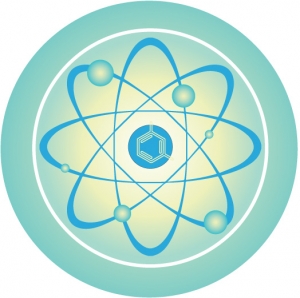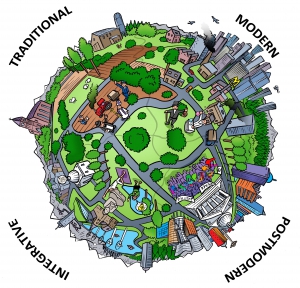
Before you read about your worldview, it’s good to realize this description is based in generalizations of the complexities of reality. These worldviews can best be seen as archetypes or ideal-types: models of recurring patterns or structures.
They cannot tell you what your unique worldview exactly is like. But they can point you in a direction, and outline a way of thinking, a framework of meaning that you may operate from, even though you may not have thought much about it.
These descriptions can therefore help us think about how we view life, nature, our fellow human beings, and ourselves. They can help us explore why we think the way we think. Knowing more about other people’s worldviews may also give us more understanding for people who think differently.


Modern worldviews
People with modern worldviews emphasize rationality and science, and they question imposed views from (religious) traditions and the past. They’re often assertive and question what they see as ‘group think’ or dogma. The philosopher Immanuel Kant declared as motto for the Enlightenment ‘sapere aude!’, Latin for ‘dare to think!’. With this, he highlighted the need to use reason to liberate oneself from superstitions and conventions of the past.
This worldview can be seen as a response to the limitations of more traditional life conditions, including the sometimes compulsive and oppressive loyalty to the group. It elevates the individual by emphasizing its inherent dignity, and it offers new ideals of democracy, equality, human rights, and freedom. There’s a sense of optimism, a future-orientation, and a belief in ‘progress’ (which was empowered by the stunning successes of the ‘modern sciences’). One of the biggest strengths of this worldview is its commitment to individual autonomy, rationality, and objectivity.
Knowledge
In the quest for truth, moderns emphasize science, rationality, and logic. They believe in the scientific method (ie., empirical measurement and experiment) and often rely on secular authorities. A central belief is that humans can investigate the world objectively, and will over time be able to explain all its ‘mysteries’. The modern view on knowledge is often described as scientistic and reductionistic, as it tends to negate and disqualify what lies outside of the confines of the empirically knowable as non-existent.
Reality
The vision of reality thus tends to be materialistic and mechanistic, which has often been symbolized by the idea of the universe as clockwork. Max Weber famously called this ‘the disenchanted universe’, where life is seen as outcome of random, bio-physical, evolutionary processes, and the existence of a higher power or divinity is rejected. Nature is no longer seen as something with spirit or intelligence, nor as a larger order we need to adapt to. Instead, it is an object humans can use, exploit, and improve upon, for their own purposes.
Identity and values
Moderns often find a sense of personal meaning and self-worth through their independence, success, and social status. They survive and succeed by competing for social power, like money and prestige. There’s great emphasis on material achievements and pleasures. Individualistic and hedonistic values – such as freedom, initiative, performance, social recognition, power, material comfort, and fun – are usually dominant.
Society
While science has been an incredibly powerful force, it has also resulted in an objectified worldview – in which what we can’t empirically measure or observe doesn’t exist. This results in a tendency to dismiss what’s subjective (ie., our inner experience). Seeing nature as object paved the way for large-scale environmental exploitation and destruction. This worldview’s emphasis on material fulfilment has turned into consumerism and a fierce, competitive capitalism. While the problems of the modern world are many, it has also brought immense scientific, technological, social, and economic progress that most people wouldn’t want to live without anymore.

Here, the modern worldview is symbolized by the standardized, functional style of architecture, smoking factories, airplanes, and global (fast food) corporations. The chemical scientist represents the scientific-rational nature of this worldview. Value and meaning in life are generally found in the material realm, symbolized by the businessman and the bag of money he is holding.
Want to learn more about the other worldviews? Read up about traditional worldviews, postmodern worldviews, and integrative worldviews.
See here an overview of the four worldviews.
Learn more about the research in which the worldview-test was developed, here.
